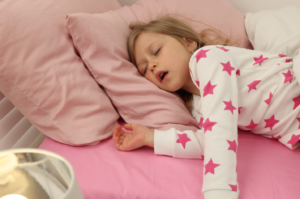Adequate sleep is essential for children's physical and mental health, promoting cognitive development, boosting immunity, and enhancing learning abilities. As parents, many often ask: "What is the best bedtime for kids?" The correct sleep time is crucial to a child's growth. This article will explore the best bedtime for children based on their age group and provide practical advice for parents to ensure healthy sleep habits.
Children's Sleep Needs: Adjusting Sleep Times According to Age
Children of different ages require different amounts of sleep. The American Academy of Sleep Medicine (AASM) recommends specific sleep durations for babies, preschoolers, school-age children, and teenagers. Ensuring that kids get enough sleep each night helps promote healthy development and academic progress.
- Infants (0-3 months): 14-17 hours per day
- Infants (4-11 months): 12-15 hours per day
- Toddlers (1-2 years): 11-14 hours per day
- Preschoolers (3-5 years): 10-13 hours per day
- School-age children (6-13 years): 9-11 hours per day
- Teenagers (14-17 years): 8-10 hours per day
Why Do Kids Need Adequate Sleep?
Adequate sleep is crucial for children's health in the following ways:
Promotes Physical Growth
Growth hormones peak during deep sleep, aiding in body repair and development. Especially for infants and preschoolers, sleep helps with the development of bones and muscles.
Improves Learning and Memory
Sleep helps the brain process and store information, which is essential for learning and memory. Studies show that children consolidate the knowledge they acquire during the day while they sleep, enhancing their memory and academic performance.
Boosts Immunity
Good sleep strengthens a child's immune system, helping them fight off viruses and bacteria. Studies have shown that sleep-deprived children are more likely to get sick and take longer to recover.
Regulates Emotions
Lack of sleep can affect a child's mood and mental health, leading to anxiety and irritability. Adequate sleep helps maintain emotional balance and reduces mood swings.
What is the Best Bedtime for Kids? – Finding the Optimal Sleep Time
According to research and expert recommendations, the best bedtime for children is usually between 8:00 PM and 9:00 PM, depending on age and biological rhythm. For preschoolers and school-age children, going to bed at 8:00 PM typically ensures they get enough rest and support healthy growth.
- Preschoolers: The optimal bedtime is around 8:00 PM to ensure they get sufficient sleep.
- School-age children: A bedtime around 9:00 PM is best, ensuring they are energized for the next day.
It is important to keep children's bedtime consistent. Irregular sleep schedules can interfere with their biological clock, affecting sleep quality.
How Can Parents Help Children Develop Good Sleep Habits?
Establish a Regular Sleep Schedule
Help children go to bed at the same time every day to regulate their biological clock. A consistent routine makes it easier for kids to feel sleepy at bedtime.
Optimize the Sleep Environment
Ensure that your child’s bedroom is quiet, comfortable, and has an appropriate temperature (18°C-22°C). Avoid electronic devices (e.g., TV, smartphone) in the bedroom, as they can interfere with sleep quality.
Avoid Overstimulating Activities Before Bedtime
Avoid vigorous exercise or exciting activities close to bedtime. Instead, encourage relaxing activities, such as reading or listening to calm music, to help children wind down and prepare for sleep.
Create a Bedtime Ritual
Activities such as reading a story, taking a bath, or listening to soothing music can help relax children before sleep. These rituals prepare them psychologically and physically for bed.
What to Do When Kids Refuse to Sleep?
Understand Your Child's Needs
Children may resist going to bed due to anxiety, fear, or stress from the day. Provide appropriate emotional comfort, such as hugging or speaking gently to them, to calm their nerves.
Adjust the Bedtime Gradually
If your child is used to a later bedtime, you can gradually move their bedtime earlier by 15 minutes each day until they adjust to a more suitable schedule.
Increase Physical Activity During the Day
Encourage outdoor activities to help your child expend enough energy during the day. Avoid long periods spent on electronic devices, as this can interfere with their biological clock.
Improving Sleep Quality and Promoting Healthy Growth
Establishing a reasonable bedtime, creating a comfortable sleep environment, and helping children develop a consistent bedtime routine are essential for every parent. By ensuring children get enough sleep, they can better cope with academic and daily challenges while benefiting from physical and emotional growth.
References:
- American Academy of Sleep Medicine (AASM). (2021). Sleep Duration Recommendations: Age-Specific Guidelines.
- National Sleep Foundation. (2020). Sleep Guidelines for Children and Adolescents.
- Centers for Disease Control and Prevention (CDC). (2020). How Much Sleep Do I Need?
- Harvard Medical School. (2019). Sleep and Brain Development.
FAQ
1. How long should my child sleep each day?
The required sleep duration varies by age. Infants need 14-17 hours, preschoolers need 10-13 hours, school-age children need 9-11 hours, and teenagers need 8-10 hours.
2. What time should my child go to bed?
Typically, preschoolers should go to bed around 8:00 PM, while school-age children should aim for a 9:00 PM bedtime. However, you can adjust bedtime based on your child’s needs.
3. How can I help my child sleep better?
The key to better sleep for children is setting a consistent sleep schedule, optimizing their sleep environment, avoiding stimulating activities before bed, and creating a relaxing bedtime ritual.
4. What if my child refuses to sleep?
Try to understand the cause, gradually adjust their bedtime, and ensure they have enough physical activity during the day. If anxiety or fear is a factor, provide emotional reassurance.
5. What are the effects of sleep deprivation in children?
Sleep deprivation can impact a child’s physical growth, learning ability, immunity, and emotional regulation. Long-term sleep deprivation may lead to various health issues.












